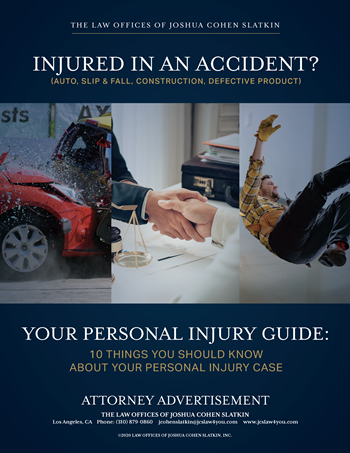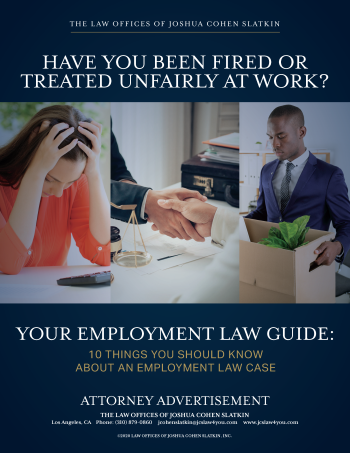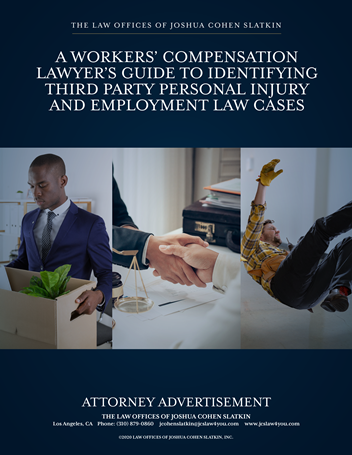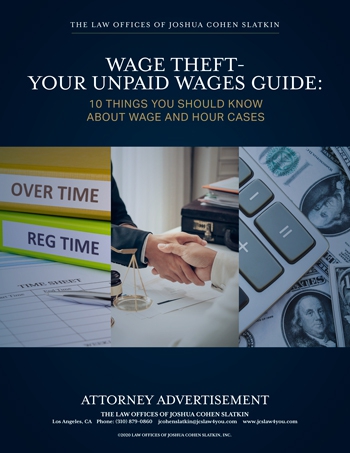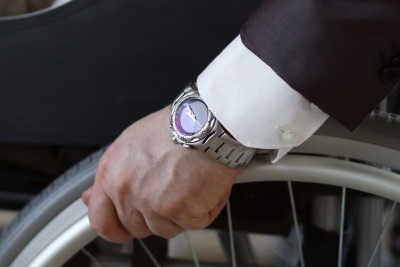
The federal Americans with Disabilities Act of 1990 (ADA) protects people with disabilities from discrimination and harassment in the workplace. Californians have enjoyed these protections since 1974 when the Fair Employment and Housing Act (FEHA) was passed. FEHA offers even broader protections than the ADA, which means California workers with disabilities should never tolerate unfair treatment, retaliation, or lack of opportunities or accommodations, including medical leaves, in the workplace.
To protect your rights under FEHA, however, you need to understand who is covered by these laws. While it is generally accepted that people in wheelchairs or with visual impairments must be accommodated in the workplace, others who struggle with limitations are often overlooked. Have you suffered discrimination at work because of a medical condition, medical leave, illness, or injury? Find out if you can take action under the ADA or FEHA.
What Is Considered a Disability or Medical Condition in California?
Under the ADA, a disability is a physical or mental impairment that can substantially limit one or more important life activities. In California, a disability is defined as a physical or mental impairment that limits a major life activity, such as walking, lifting, carrying, or performing the myriad of other physical tasks your job likely requires. California’s broader definition means that any condition that impacts your ability to work could be considered a disability and provides you with legally protected status. This condition does not have to be permanent. Along with more commonly acknowledged conditions such as paralysis, hearing and visual impairment, cognitive impairment, and multiple sclerosis, Californians whose ability to work is affected by any of the following conditions are also protected:
- Cancer
- Lupus
- Arthritis
- Irritable Bowel Syndrome or colitis
- Frequent urination
- Depression and anxiety
- Post-traumatic stress disorder (PTSD)
- Broken bones
- Back injuries
- Heart Conditions
- High blood pressure
- Alcoholism
- Pregnancy
This is not an exhaustive list, but almost any medical condition that impacts your ability to perform work-related tasks without some workplace accommodation, including changes to your schedule or work environment could be considered a disability under FEHA.
Proving a Disability Discrimination Claim
In California, companies with five or more employees must comply with FEHA. You first need to exhaust your administrative remedies by filing a complaint and obtaining a right to sue notice with the Department of Fair Employment and Housing (DFEH). The DFEH can investigate your claims, or you can obtain an immediate right to sue notice. Your lawyer typically obtains a DFEH right to sue notice. Under Assembly Bill 9, you have 3 years from the last discriminatory act (for example, the termination or demotion) to obtain your DFEH complaint and right to sue notice. When an employer engages in a continuing course of unlawful conduct by refusing reasonable accommodation of a disabled employee or engaging in disability harassment, and this course of conduct does not constitute a constructive discharge, the statute of limitations begins to run not necessarily when the employee first believes that his or her rights may have been violated, but rather, either when the course of conduct is brought to an end, as by the employer’s cessation of such conduct or by the employee’s resignation, or when the employee is on notice that further efforts to end the unlawful conduct will be in vain.
To prove that you were discriminated against because of a disability, you will generally have to prove the following:
- You suffered from a disability or were perceived by your employer as suffering from a disability.
- You were qualified to perform the essential functions of your job with or without reasonable accommodations.
- You were subjected to an adverse employment action—such as a termination, reduced pay, harassment or humiliation, demotion, denial of a leave request, undesirable reassignment, or suspension—and your disability or perceived disability and/or workplace accommodation was a reason for the adverse employment action.
It is an unlawful employment practice under FEHA “[f]or an employer…to fail to take all reasonable steps necessary to prevent discrimination for occurring.” Government Code § 12940(k). As there is evidence above supporting a finding of discrimination, there is evidence to support the claim of failure to prevent discrimination.
Please note that your disability, perceived disability, or request for workplace accommodation does not need to be the “only” reason for the adverse employment action, but it needs to be a substantial motivating reason. A substantial motivating reason means that your protected status cannot be a remote or trivial reason for the adverse employment action—it just needs to be a reason that contributed to the adverse employment action.
Once an employer is aware that you have a condition that could qualify as a disability, they are required under FEHA to engage in an interactive process with you to make appropriate workplace accommodations. The employer’s interactive process meeting must be timely and made in good faith. If a good-faith effort is not made to accommodate you, you might have a claim for discrimination. You need an attorney to help you meet these legal standards in your case.

Your Employer Must Accommodate Your Disability or Medical Condition
Under the FEHA, employers have a duty to accommodate and engage in the interactive process with employees who have a disability. All that is required is knowledge (including circumstantially) that the employee may have a condition that may qualify as a disability and result in some limitation(s) that could require an accommodation. To establish a “failure to accommodate” claim, plaintiff must show: (1) that he suffers from a disability and (2) defendant has failed reasonably to accommodate plaintiff’s disability. Courts have held that often the consequence of a failure to accommodate is the unlawful termination itself.
An employer who knows of the disability of an employee has an affirmative duty to make known to the employee other suitable job opportunities with the employer and to determine whether the employee s interested in, and qualified for, those positions, if the employer can do so without undue hardship or if the employer offers similar assistance or benefit to other disabled or nondisabled employees or has a policy of offering such assistance or benefit to any other employees.
How JCS Law Firm Can Help You
If you feel you have been the victim of discrimination in the workplace because of a disability, you don’t have to suffer alone. Request Your Employment Law Guide: 10 Things You Should Know About an Employment Law Case to learn about your rights, then contact us to discuss your specific situation. We will help you exhaust the administrative remedies necessary to file a discrimination claim based on federal or state laws and navigate the claims process to get you the compensation you deserve.
Your Employer’s Duty to Engage in a Good Faith Interactive Process
An employer must engage in a “timely, good faith interactive process … in response to a request for reasonable accommodation by an employee or applicant with a known physical or mental disability or known medical condition.” Government Code §12940(n). California case law makes clear that the employer must initiate the process if the employee’s disability is known or apparent.
California case law provides that even if an employer has taken some steps to work with an employee to identify reasonable accommodations, this does not absolve the employer of liability under Government Code §12940(n) if the employer is responsible for a later breakdown in the process.
What Can a Discrimination Claim Accomplish?
A successful discrimination lawsuit ensures that you keep your job and get the workplace accommodations you need to perform your job. A lawsuit can also prevent the employer from discriminating against other employees. In addition to keeping your job—if that’s what you want—you may also recover significant compensation, which includes:
- Payment of wages you lost when you were fired or passed over for promotion
- Future lost wages
- Past and future loss of benefits, including loss of health insurance and retirement plans such as a 401K
- Emotional distress caused by the discrimination and adverse employment action
- Attorney’s fees
- Court costs
- Punitive damages in some circumstances
An experienced employment discrimination attorney will be able to determine the value of your claim and will fight to get you the compensation you deserve.

